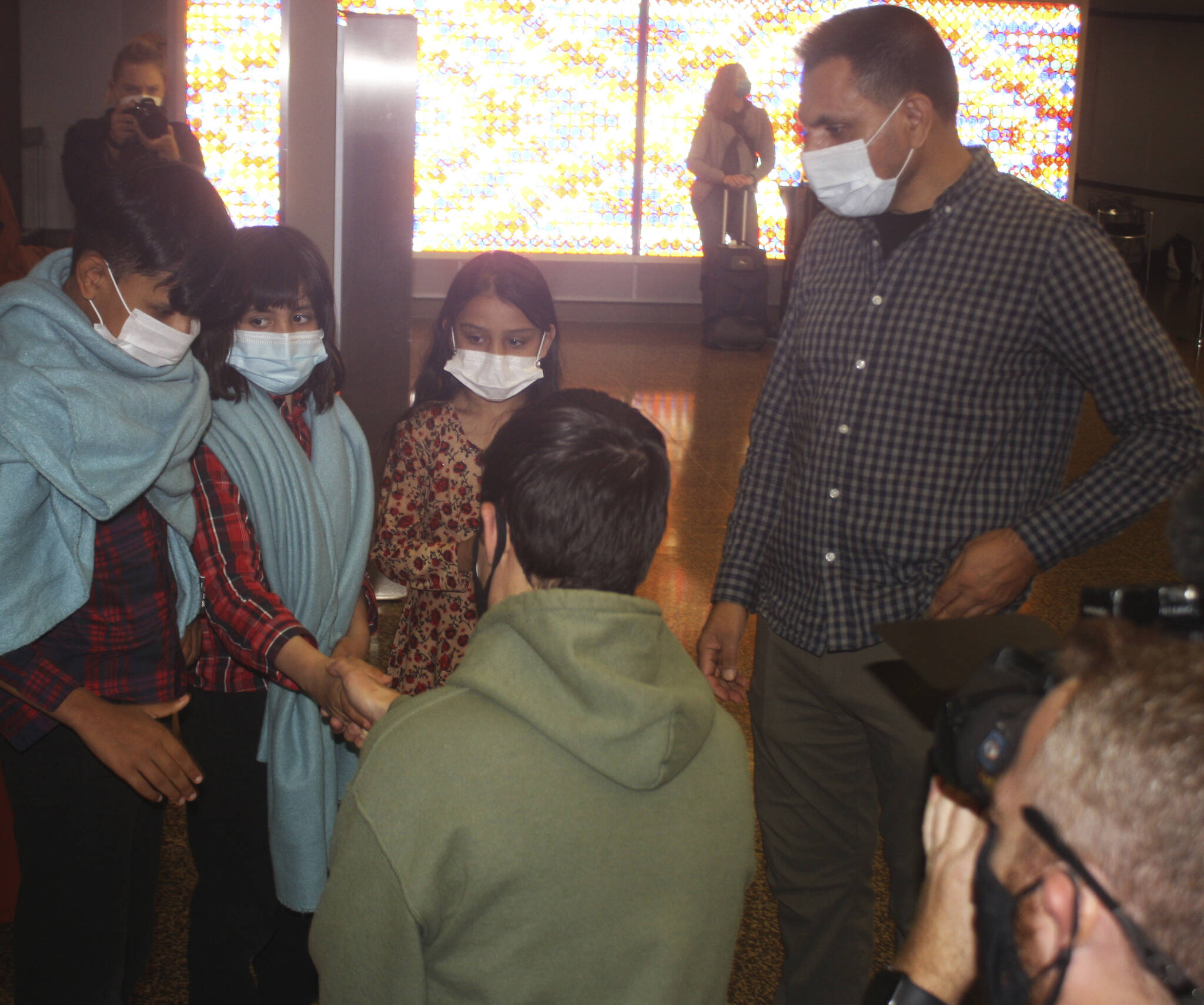Azizulla Jabarkhail couldn’t help but be in a celebratory mood at Sea-Tac Airport after greeting his wife and three young children following their long return home from Afghanistan.
“I’m so surprised and very happy today,” Jabarkhail said to reporters during a dramatic Oct. 1 reunion. “I’m celebrating this day. My family’s back here and they’re safe.”
A former interpreter and cultural advisor for five years alongside U.S. forces in Afghanistan, Jabarkhail arrived in Kent seven years ago, earning his citizenship through his service. His wife is a legal permanent resident and his children are American citizens.
In May, his wife and children, ages 12, 10 and 8 traveled to Afghanistan to visit family with plans to return in August.
“She was depressed and missing her family,” Jabarkhail said about his wife’s second return trip to Afghanistan after moving here seven years ago.
He didn’t go with them for one reason.
“I have to stay here because it’s not safe for me,” he said of his former job with the U.S. military and how the Taliban would treat him if he were found.
Jabarkhail began to fear for his family’s safety after the Taliban took over the county city by city and U.S. troops left Afghanistan at the end of August. His family was unable to get on any of the evacuation flights organized by the U.S. government.
“With the Taliban takeover, I was feeling so sad and so upset,” Jabarkhail said. “I had no idea what was going happen to my family.”
He tried by cellphone to help guide his family three times to Kabul Airport, but they were unable to get inside through the crowds to show American soldiers their passports and had to return to where they were staying.
“They were so shocked,” Jabarkhail said about talking to his family during the ordeal. “They had never seen the Taliban. They heard about them and about fighting against government. When the Taliban took over Afghanistan, they were very shocked. They knew the Taliban was against American government and those Afghans who support American government or work for them.”
That definitely scared Jabarkhail, if the Taliban somehow discovered his family.
“They have passports and are American citizens. …they might be hurt or assassinated,” he said.
Jabarkhail said his son saw the Taliban up the road one day.
“They had real guns, and he said he had never seen real guns before. They were so scared. I tried to get them stronger and encourage them.”
Veterans to the rescue
Jabarkhail said getting his family home didn’t look promising after U.S. troops left Afghanistan Aug. 31.
“I was very helpless,” he said. “It was hard to get them out. I was looking for ways to take them to Pakistan or another country to book a commercial flight for them, but it was not easy.”
A few people suggested he look into smuggling them out.
“I denied that,” he said. “Smuggling is illegal and I didn’t want to do anything illegal.”
Neighboring countries all closed their borders to Afghan refugees.
“There was no hope,” he said.
But then a Seattle Times article about veterans helping to get people out of Afghanistan led to Jabarkhail connecting with Chris Franco and Christian Dunham, two Afghan war veterans who were deployed together and continue to help with the ongoing Afghan evacuation and resettlement efforts.
Franco, who lives in Renton and works for King County, also is the Director of Military and Veterans Affairs for the Truman National Security Project’s Seattle Chapter, a group heavily involved in the Afghan evacuation efforts.
“They provided what my family needed to get from Kabul to the United States,” Jabarkhail said. “They are the champions and heroes. They saved an American family. Without them I had no hope to bring my family back.”
Franco never expected to be in such a role. But he closely watched what was going on in Afghanistan and decided to help.
“A lot of really wonderful people stepped up in big ways to help save lives and honor our promise to Afghan people,” Franco said during the airport reunion. “But it’s bittersweet. It’s beautiful to see so many people helping out, but it’s also disappointing to see what has been done and not been done by our government.”
Franco said it should have been a much smoother and safer evacuation to help many others who need to flee the country.
“We had 20 years to get a plan in place for a safe evacuation of our allies and personnel and that didn’t happen,” Franco said. “It’s an ongoing fight, and I expect it to go on for years. Hopefully, we can negotiate a safe passage for Afghan allies who served with us in our nation’s longest war.”
Franco said there are two interpreters he worked with that the Truman project is trying to get out, but it’s tougher with them than Jabarkhail’s family because they do not have passports or visas. There are also other families they are working with to get them out of Afghanistan. He estimates the Truman project has helped more than 1,000 people evacuate but thousands more are trying to flee.
About 120 people were on the flight out of Kabul that included Jabarkhail’s family. Private groups managed to find a charter flight out of the country. The flight flew to Abu Dhabi, the capital of the United Arab Emirates, and then to Chicago. There was a delay in getting landing rights in the U.S., but eventually the flight arrived.
Jabarkhail gave Dunham and Franco plenty of credit for his family’s safe return.
“They are the only two who supported me and helped me and they got my family back,” he said. “It’s a celebrating day.”
After media interviews and greetings from friends, Jabarkhail, his wife and their three children loaded up their luggage on a cart and headed out of the airport to return to Kent.
“They are home today and reunited after a very long journey,” Franco said.


